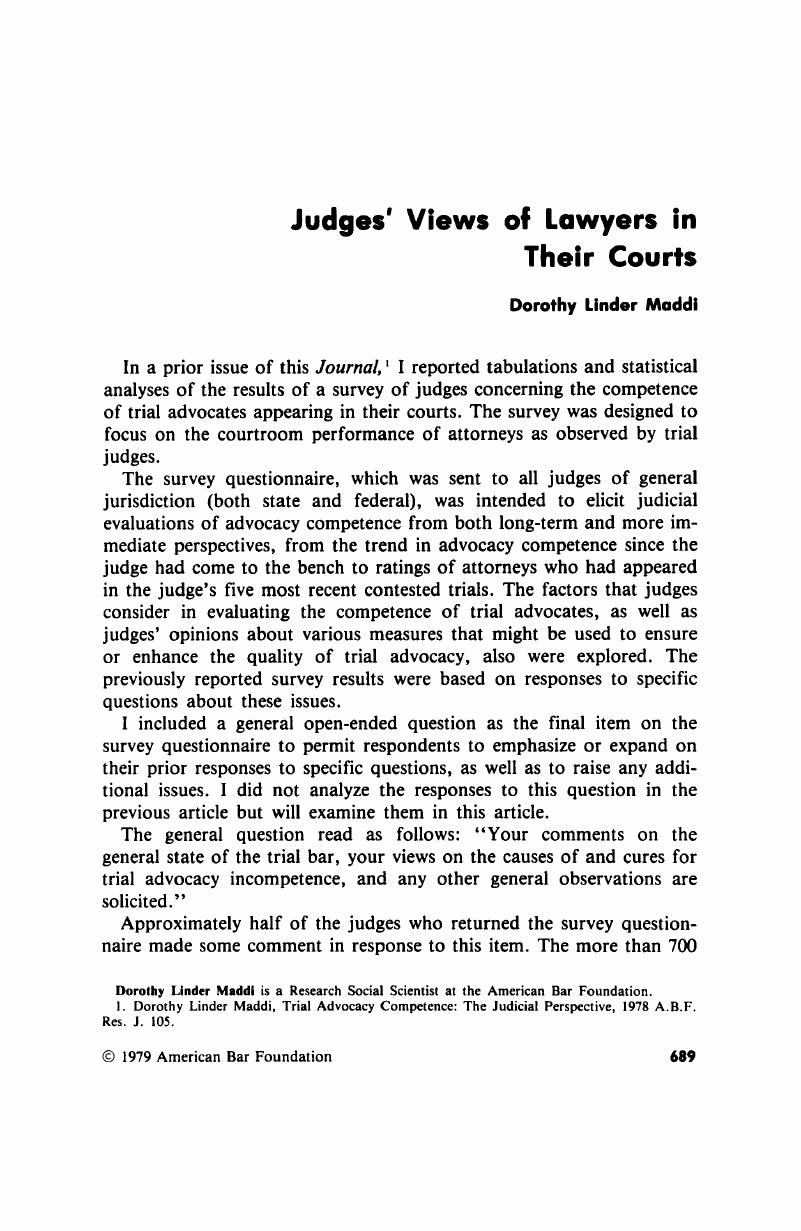Article contents
Judges' Views of Lawyers in their Courts
Published online by Cambridge University Press: 20 November 2018
Abstract

- Type
- Research Article
- Information
- Copyright
- Copyright © American Bar Foundation, 1979
References
1 Van der Maddi, Dorothy, Trial Advocacy Competence: The Judicial Perspective, A.B.F. Res. J. 19 78 105.Google Scholar
2 In response to a specific question about the trend in the quality of advocacy competence during their years on the bench, 49 percent of the judges reported little or no change, 32 percent felt it had improved, while only 19 percent thought that there had been noticeable deterioration. Id. at 121.Google Scholar
3 Comments about frequency of appearances were often interrelated with those concerning experience and specialization discussed infra at notes 9 and 10.Google Scholar
4 In response to a specific question regarding the efficacy of various methods of ensuring the competence of the trial bar, 77 percent of the judges endorsed law school education, second only to continuing legal education. Id. at 128.Google Scholar
5 Other comments in the same vein stressed that law schools should continue to perform their traditional legal education function.Google Scholar
6 Heavy reliance on high LSAT scores and grades for law school admissions was criticized by some judges for turning out what one judge termed “brilliant dopes.” Such comments tended to stress the superior capabilities of well-rounded individuals. Where lowered standards were perceived, these sometimes were linked to pressures to admit minority or women students.Google Scholar
7 In response to a specific question that asked for a listing of the factors that judges consider in evaluating the competence of trial advocates, 85 percent of the judges mentioned an aspect of preparation somewhere in their list and more than half ranked it first. Maddi, supra note 1, at 125. In addition, in response to another question, inadequate preparation was reported as the most prevalent form of incompetence. id.Google Scholar
8 While experience was seen by many judges as an important element in the development of advocacy skills, it was not seen as an adequate substitute for preparation of the case at hand.Google Scholar
9 One of the more succinct comments was, “All great trial lawyers were not great when they started. They needed experience.”Google Scholar
10 Admission to the bar of a barrister in England is sufficient for qualifying for trial work, but it must be remembered that the barrister is hired by the solicitor—also a professional—rather than the client.Google Scholar
11 In response to a specific question regarding the efficacy of various methods of ensuring the competence of the trial bar, 57 percent of the judges endorsed standards for the certification of trial specialists. Maddi, supra note 1, at 128.Google Scholar
12 In response to a specific question regarding the efficacy of various methods of ensuring the competence of the trial bar, 92 percent of the judges endorsed continuing legal education programs. Id. It should be noted that the question did not specify whether such programs would be mandatory or voluntary.Google Scholar
13 In response to a specific question, inadequate awareness of the fundamental ethics of the legal profession was reported as the least prevalent form of incompetence exhibited by less than competent advocates. Id at 125.Google Scholar
14 An example of such a conclusionary comment was, “Causes of incompetence are not all curable and the plain fact is that some lawyers simply should not be trying lawsuits.”Google Scholar
- 1
- Cited by




